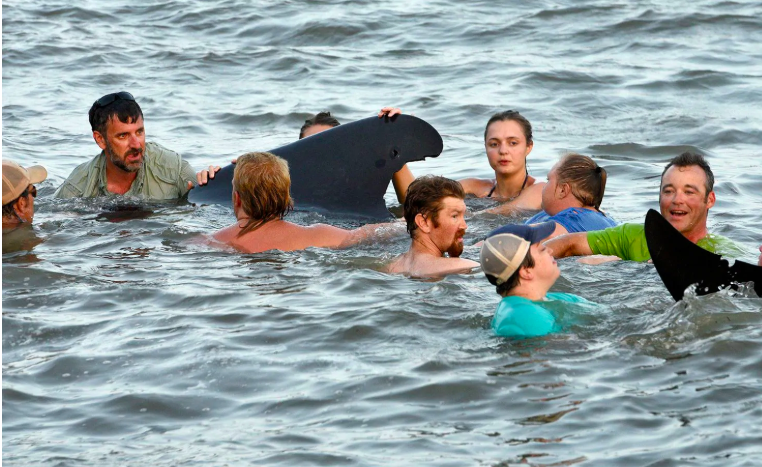
Photo: Bobby Havens, Brunswick News via AP
On Tuesday, according to the Brunswick News, dozens of short-fin pilot whales emerged in the surf close to shore on St. Simons Island, Georgia and repeatedly attempted to beach themselves, as local citizens and then marine mammal stranding experts pushed them back in the water. Unfortunately, the Associated Press reported that at least three of the whales were so harmed by the ordeal that they did not survive the night, but by the end of the day Wednesday, the remaining whales in the pod were reportedly making their way back into deeper waters offshore where they ordinarily remain.
Why This Matters: Strandings like this are a rare event. Pilot whales are extremely intelligent and social creatures and when they beach they do it in large groups leading to mass deaths. Thanks to the quick work of Georgia beachgoers and lifeguards who jumped into action and as well as local animal rescue volunteers, dozens of pilot whales were saved. It is great to see such empathy for these animals — local folks could have just let them beach but instead chose to act.
Why Did They Try To Beach Themselves?
Clay George of the Georgia Department of Natural Resources explained what likely happened to the Associated Press. He said these whales were likely extremely confused — they’re not used to seeing a sea bed under them because they typically swim in deeper water beyond the continental shelf. Why they were so confused is a mystery — but there has been some research surrounding past mass strandings.
- According to research published in The Royal Society’s Proceedings B journal earlier this year, beaked whales (pilot whales are a type of them), in particular, are so distressed by the military using sonar in training exercises that they will beach themselves or dive to extreme depths resulting in decompression sickness.
- The U.S. military does conduct undersea sonar training exercises near the Georgia coast.
- Scientists also believe that navigational errors caused by following prey into too shallow waters could also be a reason that the whales come so close to shore in a group.
- Yet another possible explanation is that healthy whales following sick whales into shore and then become stranded themselves because they struggle to remain near the dying whale — whales and dolphins are known to have strong social bonds.
- Finally, scientists surmise that other natural causes of loud noises could also cause similar flight or fight responses in whales akin to naval sonar.
Seem To Be Heading Out To Sea.
The Georgia Department of Natural Resources spokesman Rick Lavender told the AP that the pod of whales remained offshore Wednesday afternoon and that the state had a boat with conservationists from National Marine Mammal Foundation following the whales and that a helicopter also was searching for more stranded whales but found none.
H/T to Raleigh and Stephanie, our partners at the St. Simons Land Trust, for this good news story!
July 17, 2019 » beaching, marine mammals, mass stranding, Navy, pilot whales, sonar, whales


